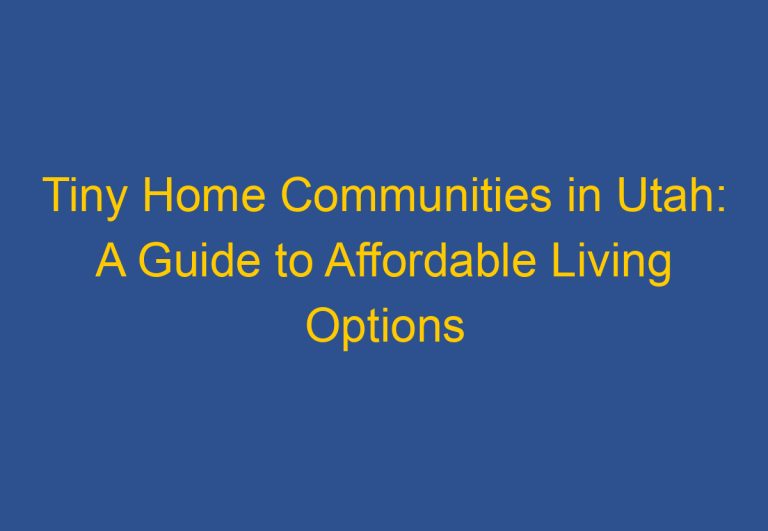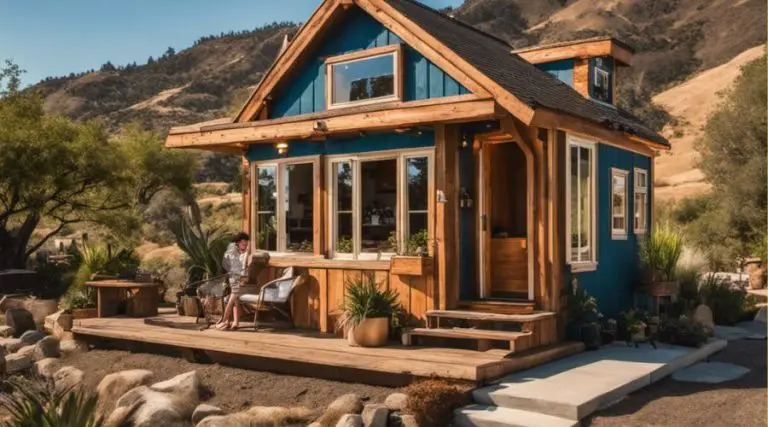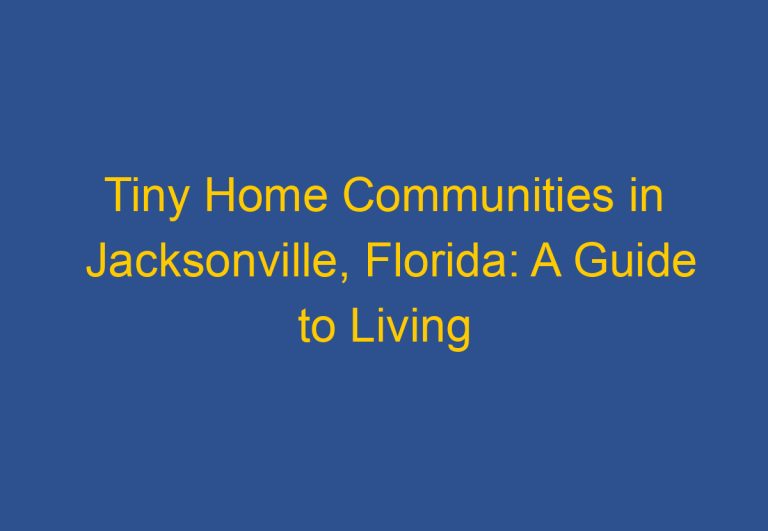Are There Any Tiny House Communities in Michigan? Exploring the Options
Michigan is a state that offers a variety of living options, including tiny house communities. With the tiny house movement gaining popularity across the country, many people are looking for affordable housing options that allow them to live a minimalist lifestyle. Tiny house communities in Michigan provide an opportunity for individuals to downsize and simplify their lives while living among like-minded people.
For those interested in exploring tiny house communities in Michigan, there are several options to choose from. Green Street Tiny Homes in Grand Rapids and Tiny House Siesta in Detroit offer homes for rent, with a range of rental options available from short-term stays to long-term leases. These communities provide a sense of camaraderie and shared values among residents who are passionate about sustainable living.
In addition to rental options, there are also tiny houses for sale in Michigan. Tiny Home Builders lists 20 tiny house listings in the state, with a variety of styles and sizes available. Whether you are looking to rent or buy, there are plenty of opportunities to explore the tiny house lifestyle in Michigan.
Understanding Tiny House Communities in Michigan
Tiny house communities are becoming increasingly popular across the United States, and Michigan is no exception. These communities offer a unique living experience that is both sustainable and affordable. In this section, we will explore the legal landscape and zoning requirements for tiny house communities in Michigan, the different types of tiny homes and their foundations, and the benefits of tiny living.
Legal Landscape and Zoning Requirements
Before considering living in a tiny house community in Michigan, it is essential to understand the legal landscape and zoning requirements. Michigan has different zoning regulations for each county, and it is important to research the specific requirements for the county you are interested in. Some counties have minimum size requirements for homes, while others have no such restrictions.
In addition to zoning requirements, there may be local laws and building codes that must be followed. For example, the International Residential Code (IRC) is the most commonly used building code in Michigan, and it sets minimum standards for safety and health. Michigan also has its own building code, the Michigan Building Code, and the Michigan Residential Code.
Types of Tiny Homes and Their Foundations
There are two main types of tiny homes: tiny houses on wheels and tiny houses on a foundation. Tiny houses on wheels are often referred to as THOWs and are built on a trailer. They are designed to be portable and can be moved from one location to another. Tiny houses on a foundation are built on a permanent foundation and are not designed to be moved.
When it comes to foundations, there are several options available. Some tiny homes are built on a concrete slab, while others are built on a crawl space or basement. Others are built on piers or posts, which can be adjusted to level the home on uneven terrain.
Benefits of Tiny Living
There are many benefits to living in a tiny house community in Michigan. One of the most significant benefits is the opportunity to live a sustainable and eco-friendly lifestyle. Tiny homes use less energy and resources than traditional homes, which can help reduce your carbon footprint.
Another benefit of tiny living is the opportunity to downsize and simplify your life. Living in a tiny home forces you to prioritize what is important and can help you focus on experiences rather than material possessions. Additionally, living in a tiny house community can provide a sense of community and connection with like-minded individuals.
In terms of property tax, tiny homes are often classified as accessory dwelling units (ADUs), which can result in lower property taxes. However, it is essential to research the specific property tax laws in your county to determine if this is the case.
Overall, tiny house communities in Michigan offer a unique and sustainable living experience that is worth considering. By understanding the legal landscape and zoning requirements, the different types of tiny homes and their foundations, and the benefits of tiny living, you can make an informed decision about whether a tiny house community is right for you.
Exploring Tiny House Communities and Amenities
Tiny house living has become increasingly popular in recent years, and Michigan is no exception. There are several tiny house communities scattered throughout the state, each with their own unique features and amenities. In this section, we’ll explore some of the most popular tiny house locations in Michigan, as well as the community features and services you can expect to find.
Popular Tiny House Locations in Michigan
There are several tiny house communities located throughout Michigan, with some of the most popular being in Detroit, Grand Rapids, Traverse City, Ann Arbor, Briley Township, and Leelanau County. Many of these communities are situated near the Great Lakes, offering beautiful views and access to sandy beaches, fishing, and water sports.
Community Features and Lifestyle
Tiny house communities in Michigan offer a unique lifestyle that is focused on simplicity, sustainability, and community. Many of these communities feature solar power, which allows residents to live off the grid and reduce their carbon footprint. In addition, many communities offer amenities such as tennis courts, fitness centers, pools, clubhouses, and community centers, which provide opportunities for residents to socialize and engage in community activities.
Services and Facilities
Tiny house communities in Michigan also offer a range of services and facilities to make daily life more convenient. These may include laundry facilities, meeting rooms, fire pits, restaurants, and even TV, kitchen, bathroom, and bedroom facilities. Some communities also offer spa services, which can be a great way to relax and unwind after a long day.
Overall, tiny house living in Michigan can offer a unique and fulfilling lifestyle that is focused on community, sustainability, and simplicity. Whether you’re looking for a permanent residence or a vacation home, there are plenty of options to choose from in Michigan’s tiny house communities.
Frequently Asked Questions
What are the legal requirements for establishing a tiny house community in Michigan?
To establish a tiny house community in Michigan, one must ensure that the community complies with all local building codes and zoning requirements. The state of Michigan allows couples to build a home of about 250 square feet, while houses for families of four must be at least 450 square feet.
How do tiny house communities in Michigan compare to those in other states in terms of amenities and services?
Tiny house communities in Michigan offer a unique living experience that is different from those in other states. The communities in Michigan are known for their eco-friendly features, including solar panels, rainwater harvesting systems, and other sustainable practices. The amenities and services offered in these communities vary depending on the location, but they generally include communal spaces, shared gardens, and community events.
Can you provide a list of tiny house communities located near Grand Rapids or Ann Arbor?
Yes. There are several tiny house communities located near Grand Rapids or Ann Arbor. Some of these communities include Lake Shore Tiny Home Community in Whitehall, Hope Village, and Briley Township in the Upper Peninsula.
What are the average costs associated with purchasing a tiny home in Michigan?
The cost of purchasing a tiny home in Michigan varies depending on the size, location, and amenities of the home. On average, a tiny home in Michigan can cost anywhere from $30,000 to $100,000.
Are there options for renting within tiny house communities in Michigan?
Yes. Some tiny house communities in Michigan offer rental options for those who are not ready to purchase a tiny home. The rental costs and availability vary depending on the community.
What should one consider when looking to join a tiny house village in Detroit or other Michigan cities?
When looking to join a tiny house village in Detroit or other Michigan cities, one should consider the location, amenities, and community culture. It is important to research the community thoroughly and visit the location before making a decision. One should also consider the legal requirements and zoning regulations in the area.










